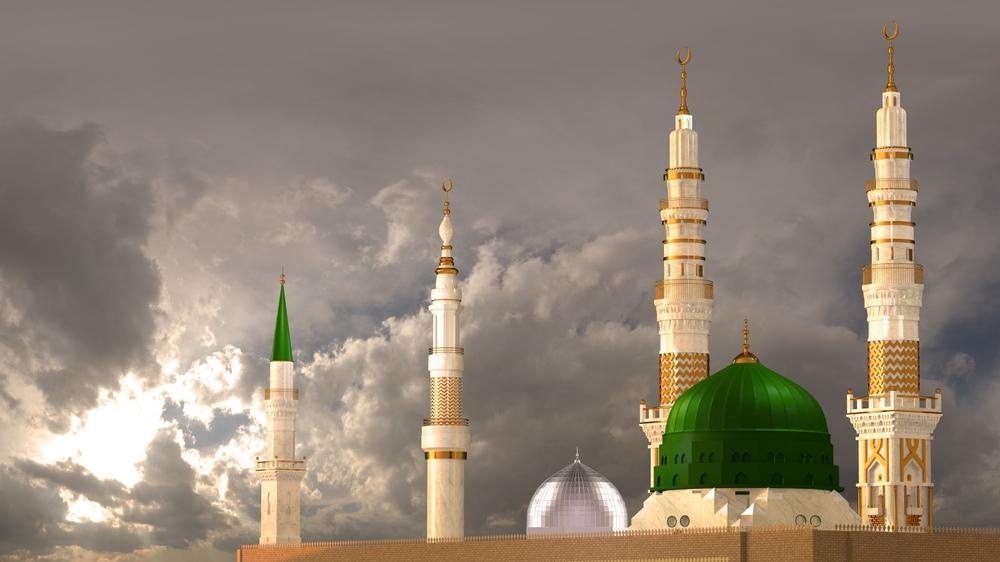
Rabi Al-Awwal translates to ‘the first spring’, referring to new life sprouting from the ground. It was in this month that Prophet Muhammad (PBUH) was born in Makkah, and many Muslims around the world celebrate this with the Mawlid Al-Nabi.
The month of Rabi Al-Awwal will begin on 17 September 2023 and end on 15 October.
Some Muslims believe that the Prophet (PBUH) was born on the 12th of Rabi Al-Awwal, while others believe it was on the 17th. However, it is agreed that he was born on a Monday and fasting on Mondays is Sunnah: ‘The Messenger of Allah (SAW) was asked about fasting on Mondays, whereupon he said: “On it, I was born and on it, revelation was sent down to me” (Muslim).’
Rabi Al-Awwal also marks the Hijrah (migration) from Makkah to Madina and the death of the prophet (PBUH).
There were many miracles with the birth of the Prophet (PBUH), including that Aaminah, his mother, saw light within her when she was pregnant with him. Another was that the Prophet’s (PBUH) wet nurse, Halima Sa’diyah was blessed for many years after caring for and nursing him. Halima Sa’diyah’s weak donkey became faster and stronger than the others, and her goat produced more milk than normal, which fed her and her family.
Prophet Muhammad (PBUH) was born around 50 days after the event where the Abyssinian ruler, Abraha, tried to destroy the Kaaba by storming through the land with 13 elephants. His elephant, Mahmud, refused to move toward Makkah, even though he was being beaten and pushed.
An army of birds then dropped stones on Abraha’s men, who were all either killed or badly injured. Abraha himself was injured and returned to Yemen. Allah (SWT) ruined Abraha’s plans and prevented the Kaaba from being destroyed, which later became the House of Allah (SWT), where Muslims perform the pilgrimages of Hajj and Umrah.
These events show the month of Rabi Al-Awwal to be special and should encourage us to learn more about the Prophet (PBUH), his birth, and his character so that we may try to be more like him.
During Rabi Al-Awwal, the first masjid was built. The Prophet Muhammad (PBUH) and Abu Bakr (RA) built it in a town called Quba, which was near Yathrib (Madina). They stayed there for three days to finish building it and then moved on to Yathrib, where they built the Masjid An-Nabi. This masjid construction makes Rabi Al-Awwal even more important for Muslims.
The death of the Prophet Muhammad (PBUH) also occurred in the month of Rabi Al-Awwal, in the 11th year of Islam. He was ill for a few days before his death, but his passing still shocked the Muslims. Umar (RA) could not properly comprehend that the Prophet (PBUH) had left this world and denied that he had died. However, Abu Bakr’s (RA) words gave comfort: ‘O people! If it was Muhammad whom you worshipped, then know that he is dead. But if it is Allah (SWT) whom you worshipped, then know that He does not die’.
In saying this, Abu Bakr reminded the Muslims that the Prophet Muhammad (PBUH) was just a Messenger and that we should worship Allah (SWT) alone while following the practices of the Prophet Muhammad (PBUH).
Donate to UKIM during this month to support those in need, including widows, refugees, and orphans. ‘The Prophet Muhammad (PBUH) said, “the one who cares for an orphan and myself will be together in paradise like this” and he held his two fingers together to illustrate’. (Bukhari)
Copyright © 2025 UKIM All Rights Reserved.
UK Registered Charity Since 1962
Charity Registration No. 250275


